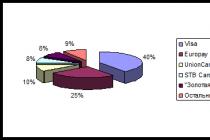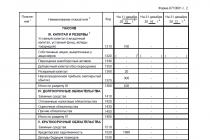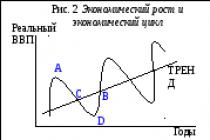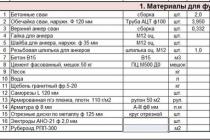M.N. Akhtanina, lawyer
Penalties for non-submission of documents and information to tax authorities
When and what penalty can be charged for late submission of documents or information to the inspection
Since the autumn of last year, fines under articles 126 and 129 of the Tax Code have increased significantly. Therefore, everyone needs to know for what exactly responsibility is established by these articles and when it can be applied. Let's start with the most common fine - for non-submission and late submission of documents.
Penalty under paragraph 1 of Article 126 of the Tax Code
Violation under paragraph 1 of Art. 126 NC is expressed in non-submission taxpayers (payers of fees) or tax agents within the term of documents or other information, which according to the tax legislation:
Penalty for failure to submit set time taxpayer (fee payer, tax agent) to the tax authorities of documents or information provided for tax legislation, is:
- <если>the deadline for submitting documents expired on 09/02/2010 or earlier - 50 rubles. for each document t paragraph 1 of Art. 126 of the Tax Code of the Russian Federation (as amended, in force until 09/03/2010);
- <если>the deadline for submitting documents expired on 03.09.2010 or later - 200 rubles. for each document t paragraph 1 of Art. 126 Tax Code of the Russian Federation.
- <или>claimed by the tax authority the person against whom the cameral or visiting examination. With this, everything is more or less clear. about pp. 6, 8, 9 st. 88, paragraph 12 of Art. 89, paragraph 1 of Art. 93 Tax Code of the Russian Federation;
- <или>organization or entrepreneur should represent to the tax authorities independently due to the fact that they are taxpayers or tax agents.
Consequently, according to this rule, it is impossible to fine for non-submission (late submission) of documents or information requested as part of a cross-check and pp. 1, 2 art. 93.1 of the Tax Code of the Russian Federation.
What documents do taxpayers have to submit on their own?
These are, in particular:
- opening or closing messages separate subdivisions organization, as well as messages about a change in the address, name or head of the EP (forms No. С-09-3-1 and No. С-09-3- 2Letter of the Federal Tax Service of Russia dated 03.09.2010 No. MN-37-6 / [email protected] )sub. 3, 3.1 p. 2 art. 23 Tax Code of the Russian Federation;
- financial statements organizations (except organizations using USNO )sub. 5 p. 1 art. 23 Tax Code of the Russian Federation;
- tax calculations on advance payments on corporate property tax th approved Order of the Ministry of Finance of Russia dated February 20, 2008 No. 27n; paragraph 1 of Art. 386 Tax Code of the Russian Federation;
- notifications of participation in a Russian or foreign organization, that is, the acquisition of shares or a stake in the authorized capital of an LLC (form No. C-09- 2 )sub. 2 p. 2 art. 23 Tax Code of the Russian Federation;
- notification of the decision taken by the organization on reorganization or liquidation (form No. С-09- 4approved Order of the Federal Tax Service of Russia dated April 21, 2009 No. MM-7-6 / [email protected] )sub. 4 p. 2 art. 23 Tax Code of the Russian Federation.
At the same time, please note that if the Tax Code establishes special liability for failure to submit a specific document, then the fine should be imposed according to a special rule, and not according to paragraph 1 of Art. 126 NK. These documents include:
- an application for tax registration on the grounds provided for by the Tax Code (for example, an application for registration of an organization as a UTII payer (form No. UTII- 1approved Order of the Federal Tax Service of Russia dated January 14, 2009 No. MM-7-6 / [email protected] )paragraph 2 of Art. 346.28 of the Tax Code of the Russian Federation) ;
- opening or closing messages bank account(Form No. С-09- 1approved Order of the Federal Tax Service of Russia dated April 21, 2009 No. MM-7-6 / [email protected] )sub. 1 p. 2 art. 23 Tax Code of the Russian Federation;
- tax returns and paragraph 1 of Art. 80 Tax Code of the Russian Federation.
Responsibility for failure to submit these documents is established by Articles 116, 118 and 119 of the Tax Code of the Russian Federation, respectively.
You can not be fined under paragraph 1 of Art. 126 of the Tax Code and when the obligation to submit to tax authority any documents or information is established not by tax, but by some other legislation. It is likely that for their failure to submit administrative penalty but definitely not tax.
For example, a change in the head of an organization must be reported to the tax office. Yu sub. "l" paragraph 1 of Art. 5, paragraph 5 of Art. 5 of the Federal Law of 08.08.2001 No. 129-FZ “On State Registration of Legal Entities and Individual Entrepreneurs”. For failure to fulfill this obligation, an administrative fine may be imposed on the new head. f Part 3 Art. 14.25 Code of Administrative Offenses of the Russian Federation.
For non-submission of which documents tax agents are fined
Organizations and entrepreneurs - tax agents must independently submit to the IFTS:
- VAT returns, even if the tax agent himself is not the payer of this tax I paragraph 5 of Art. 174 Tax Code of the Russian Federation;
- tax calculations for income tax (on income paid in the form of dividends by organizations - non-payers of this tax )paragraph 1 of Art. 289 of the Tax Code of the Russian Federation;
- information about the amounts paid foreign organizations income and withholding tax in approved Order of the Ministry of Taxes and Taxes of Russia dated April 14, 2004 No. SAE-3-23 / [email protected]; paragraph 4 of Art. 310 Tax Code of the Russian Federation;
- information on income paid to individuals, the amounts of tax calculated, withheld and transferred to the budget on income of individuals (form 2-NDF L approved Order of the Federal Tax Service of Russia dated November 17, 2010 No. ММВ-7-3/ [email protected] )paragraph 2 of Art. 230 Tax Code of the Russian Federation;
- messages about the impossibility to withhold tax from income paid to an individual (form 2-NDFL )paragraph 5 of Art. 226 of the Tax Code of the Russian Federation; Clause 2 of the Order of the Federal Tax Service of Russia dated November 17, 2010 No. ММВ-7-3/ [email protected] .
When you can not fine for failure to provide documents upon request
About what documents you can not submit to the tax authorities during desk audit, without fear of a fine, read: 2010, No. 19, p. eighteenThe powers of the tax authorities to request documents during an on-site or in-house audit are not unlimited. In a desk audit, they are quite severely limited by Art. 88 of the Tax Code of the Russian Federation. And even during an on-site audit, only documents relating to the audited tax and period can be requested. Hence the conclusion: if the tax authority has demanded documents that it is not entitled to demand, you have every right not to submit them and you cannot be fined for this. I. For example, you cannot penalize for failure to submit:
Attention
If you require documents that you already submitted copies of during the audit in 2010 and later, you do not need to resubmit them.
- invoices requested during a desk audit of a VAT declaration in which the tax was not declared for reimbursement Yu pp. 7, 8 art. 88 Tax Code of the Russian Federation;
- invoices issued in 2009, claimed during the on-site VAT audit for 2010;
- any documents, copies of which have already been submitted to the tax authority during a tax audit starting from 01.01.201 0paragraph 5 of Art. 93 of the Tax Code of the Russian Federation; Decree of the FAS Central Organ of December 14, 2010 No. A68-3284 / 10-135 / 18.
Another limitation is that the tax authority is generally not entitled to demand documents from the person being checked outside the framework of an on-site or desk audit. and paragraph 1 of Art. 93 Tax Code of the Russian Federation. After all, there is simply no procedure for requesting documents for such a situation in the Tax Code. For example, on 07/20/2010 you filed a VAT return claiming the right to a tax refund. During a desk audit of this declaration, the inspectorate has the right to demand from you documents confirming the right to deduct VAT on this declaration. and paragraph 8 of Art. 88, paragraph 1 of Art. 172 Tax Code of the Russian Federation. But if the requirement to submit these documents is made after October 20, 2010 (outside the three-month period allotted for conducting a desk audit and paragraph 2 of Art. 88 Tax Code of the Russian Federation), you have the right not to respond to it and fine you under paragraph 1 of Art. 126 NK is impossible. This conclusion is also supported by VA FROM Decree of the Presidium of the Supreme Arbitration Court of the Russian Federation dated November 17, 2009 No. 10349/09, and Minfi n Letter of the Ministry of Finance of Russia dated November 24, 2008 No. 03-02-07 / 1-471.
Attention
If the tax authority is not entitled to claim any document, then it is impossible to fine for its failure to submit.
Also note that in paragraph 1 of Art. 126 of the Tax Code refers to liability only for failure to submit documents provided for by tax legislation. That is, if the document is not mentioned in the tax legislation, then you cannot be fined for not submitting it. I Clause 8 of the Information Letter of the Presidium of the Supreme Arbitration Court of the Russian Federation dated March 14, 2006 No. 106. And the courts, as a rule, come to the conclusion that it is impossible to fine under Art. 126 of the Tax Code for failure to submit documents that are not provided for by either accounting or tax legislation, as well as documents that you can draw up, but are not required to. In particular, the courts found it illegal to hold liable for failure to provide e paragraph 1 of Art. 126 Tax Code of the Russian Federation:
- lists of fixed assets related to different types activities, lists of leased real estate, calculations of the distribution of income and expenses for various types of activities and Decree of the Federal Antimonopoly Service of the Moscow Region dated March 9, 2010 No. КА-А40/1571-10;
- certificates and declarations of compliance of manufactured products with the requirements of GOST, copies of letters from Ros-sta-ta confirming the code according to All-Russian classifier foreign economic activity and Decree of the FAS SZO dated September 24, 2009 No. A42-5230 / 2006;
- economic justification for the calculation rent payments, details of negotiations with mobile phones and orders to set spending limits on mobile communications, calculations confirming the expediency of refusing to exercise the option and the expediency of acquiring financial instruments urgent deals to Decree of the FAS Central Organ of October 27, 2009 No. A48-973 / 2009;
- operator and dispatcher lists in Decree of the FAS UO dated February 20, 2008 No. Ф09-11449 / 07-С2;
- copies of issued promissory notes th Decree of the FAS UO of December 17, 2009 No. Ф09-10019 / 09-С3;
- staffing I Decree of the FAS PO dated April 22, 2008 No. A55-11630 / 07.
The next question is: is it possible to be fined for not submitting documents that were not drawn up, although they should have been? The answer seems to be obvious. Failure to fulfill the obligation to draw up a document should not exempt from liability for its failure to submit. After all, no one is trying to challenge the penalty for not filing a tax return. and Art. 119 Tax Code of the Russian Federation simply because they did not manage to draw it up by the deadline.
There are also courts that point to the legality of the fine under paragraph 1 of Art. 126 of the Tax Code in case of failure to submit documents due to the fact that they are not drawn up s Decrees of the FAS ZSO dated 06/01/2009 No. F04-3216 / 2009 (7623-A03-37); FAS UO dated 03/24/2008 No. Ф09-1746 / 08-С3. However, oddly enough, they are in the minority. And the majority of courts adheres to the position according to which there can be no fine in such a situation. The logic is simple: since the document was not drawn up, then it could not be submitted on time, demand-driven, for objective reasons. For example, the courts have pointed out that it is not possible to penalize for non-drafted and non-submitted:
- certificates in the form 2-NDF L Decree of the FAS VVO of 04/07/2008 No. A29-5357 / 2007;
- books of accounting for income and expenses of organizations and individual entrepreneurs using a simplified taxation system I Decrees of the FAS SZO dated February 20, 2009 No. A42-3046 / 2008; FAS SKO dated August 27, 2009 No. A32-13466 / 2006-12 / 295;
- shopping and sales books and Decree of the FAS UO of 04/09/2009 No. Ф09-1830 / 09-С3;
- accounting policy orders e Decree of the Federal Antimonopoly Service of the Central Organ of February 15, 2010 No. A35-9027 / 08-C21.
Of course, if the decision to prosecute has already been made, any arguments to challenge it are good. And taxpayer-friendly practices can and should be used.
At the same time, keep in mind: when justifying the non-submission of mandatory primary documents and invoices by the fact that they were not drawn up, you can "get" a fine under Art. 120 NK.
In addition, it is natural that the courts recognize illegal fines under paragraph 1 of Art. 126 of the Tax Code, if the documents are not submitted due to the fact that they:
- <или>kidnapped s Decrees of the FAS Central Organ of October 23, 2008 No. A36-686 / 2008; FAS UO dated July 28, 2008 No. Ф09-1296 / 08-С3;
- <или>seized by another government agency (in particular, the police )Decrees of the FAS PO dated 05.22.2009 No. A57-11985 / 06; FAS SZO dated 06/18/2009 No. A21-8111 / 2008; FAS UO dated 12/15/2009 No. Ф09-3586 / 09-С3;
- <или>lost for other reasons (for example, in an accident or natural disaster )Decrees of the FAS SZO dated 03.09.2010 No. A56-47676 / 2009; FAS VVO dated 06/08/2009 No. A17-7256 / 2008; FAS PO dated 31.08.2009 No. А06-2877/08.
As you understand, this is due to the fact that under such circumstances there is no fault of the organization or entrepreneur in the failure to submit documents. And without guilt there is no responsibility and Art. 106 of the Tax Code of the Russian Federation, paragraph 2 of Art. 109 Tax Code of the Russian Federation. For the same reason, the courts recognize as unlawful a fine for failure to submit documents due to the fact that an organization or entrepreneur did not receive a demand from the tax authority sent to them by mail. e paragraph 2 of the motivational part of the Ruling of the Constitutional Court of the Russian Federation dated 04/08/2010 No. 468-О-О; Decrees of the FAS MO dated 01/11/2009 No. KA-A41 / 12621-08; FAS PO dated March 23, 2010 No. A65-26274 / 2009; FAS UO dated 02.08.2010 No. Ф09-5912 / 10-С2. Moreover, it is the tax authority that must prove receipt of the claim. n paragraph 6 of Art. 108 of the Tax Code of the Russian Federation; Part 5 Art. 200 agrarian and industrial complex of the Russian Federation.
Can I be fined for misrepresentation of documents?
The rules for submitting documents at the request of the tax authority are simple s pp. 2, 3 art. 93 Tax Code of the Russian Federation:
- documents on paper are submitted in person or sent by registered mail in the form of copies certified by the signature of the inspected entrepreneur or the signature of the head and the seal of the organization being inspected;
- documents drawn up in in electronic format according to the established formats, can be submitted through telecommunication channels;
- documents must be submitted within 10 working days from the date of receipt of the request. This period may be extended at the written request of the organization or entrepreneur. Such an application must be submitted on the next working day after the day the request was received. I paragraph 6 of Art. 6.1 Tax Code of the Russian Federation.
There is no doubt that a violation of the deadline for submitting documents can be fined, this is directly indicated in the Code e paragraph 4 of Art. 93, paragraph 1 of Art. 126 Tax Code of the Russian Federation.
But is it possible to fine if an organization or an entrepreneur filed a petition for an extension of the term, but the inspection did not satisfy it? At present, most courts answer this question in the negative. about Decrees of the FAS MO dated 08.12.2010 No. KA-A40 / 14679-10; FAS SZO dated 09/03/2010 No. A56-47676 / 2009; FAS UO dated 08.12.2010 No. Ф09-10096 / 10-С3.
Of course, in order for the court to stand in similar situation on your side, the request for an extension of the deadline for the submission of documents must be motivated. That is, it should indicate the reasons why you objectively cannot submit documents within the usual time frame. It could be a large number of requested documents or the need to deliver them from another locality(for example, when documents located at the head office of the company were requested during the branch check). It will also be in your favor that you submit at least part of the documents requested by the tax authority on time.
If there is even the slightest risk of not submitting the documents required by the inspection on time, you need to file a petition for an extension of the deadline. Even if the inspection does not extend it, and we cannot submit the documents on time, the very fact of filing such a petition will help to challenge the fine under paragraph 1 of Art. 126 NK.
The next question is: is it possible to be fined for submitting uncertified (or improperly certified) copies of requested documents on time? Formally, such an act of an offense under paragraph 1 of Art. 126 NK, does not form. Once the Federal Antimonopoly Service of the Urals District agreed with this. a Decree No. Ф09-6550/08-С3 dated 15.09.2008. However, be aware that, instead of penalizing the submission of uncertified copies, the tax authority may simply refuse to accept them. The legitimacy of such a refusal was recognized by the Federal Antimonopoly Service of the Moscow District a Decree No. КА-А41/11390-09 dated 05.11.2009. And if, as a result, duly certified copies of documents are submitted by you in violation of the deadline, the tax authorities will no doubt fine you for this. And, unfortunately, it is not a fact that the court recognizes such a fine as illegal.
Sometimes the tax authorities fine under paragraph 1 of Art. 126 of the Tax Code for submission of documents filled out incorrectly. But, as you understand, this is illegal. Therefore, the chances of challenging such a fine in court are very high. and Decrees of the FAS Central Organ of August 22, 2006 No. A09-1974 / 06-12; FAS MO dated January 15, 2010 No. KA-A40 / 14964-09; FAS SKO dated November 21, 2007 No. F08-7689 / 2007-2870A. Including if the documents were submitted in electronic form, and errors in them led to the fact that the input control protocol indicated that the documents were not accepted s Decrees of the FAS ZSO dated 03/20/2008 No. F04-1001 / 2008 (669-A67-19); FAS MO dated September 14, 2009 No. KA-A40 / 9158-09; FAS SZO dated November 22, 2010 No. A56-7553 / 2010.
How is the fine calculated under paragraph 1 of Article 126 of the Tax Code
The fine is set at 200 rubles. for each document not submitted or submitted late t paragraph 1 of Art. 126 Tax Code of the Russian Federation. It seems that the arithmetic is simple: they did not submit one document - a fine of 200 rubles, did not submit 100 documents - a fine of 20,000 rubles. Thus, in order to calculate the fine, you just need to know exactly how many documents the organization or entrepreneur did not submit.
When the documents, albeit belatedly, but nevertheless, are submitted, the tax authority will simply be able to count their number. And in order to determine the amount of the fine for failure to submit documents, ideally, their exact number should be indicated in the demand of the tax authorities. For example, the demand says: “Please provide an invoice issued by Leshy OJSC when shipping cranberries in September 2010 - 1 piece.” However, in practice this does not happen. Because the tax authority simply does not have data on the number of invoices received by the taxpayer. And then he writes in the demand: "Submit invoices for goods (works, services) purchased in the III quarter of 2010."
And how, in this case, to calculate the amount of the fine, if the taxpayer has not submitted an invoice? It is impossible to calculate a fine by eye, this was explained to the tax authorities 3 years ago by the VA FROM Decree of the Presidium of the Supreme Arbitration Court of the Russian Federation of 04/08/2008 No. 15333/07. Therefore, in order to calculate the fine, the tax authority can and must obtain data that allows determining the exact number of non-submitted documents. And he can do it in two ways.
Method one: to establish the number of unsubmitted documents based on the results of cross-checks, within which documents will be received from counterparties of the checked person, copies of which this person must have. Such documents can be invoices, contracts, waybills. That is, any documents that are drawn up in two copies or that have a tear-off part transferred to the counterparty. So, about the existence of income cash warrant(form KO-1) approved Decree of the State Statistics Committee of Russia dated 18.08.98 No. 88 tax authorities can find out by receiving a copy of the receipt to the PC O Instructions ... approved. Decree of the State Statistics Committee of Russia dated 18.08.98 No. 88.
The second way: to establish the number of unsubmitted documents based on the results of the seizure of documents from the person being checked. If 100 invoices received during the purchase of goods (works, services) in the III quarter of 2010 are withdrawn, then based on this number, the fine should be calculated. True, the tax authority can use this method only during an on-site audit e paragraph 4 of Art. 93, paragraph 1 of Art. 94 Tax Code of the Russian Federation.
Conclusion
The correctness of the calculation of the amount of the fine under paragraph 1 of Art. 126 of the Tax Code must be supported by documents that make it possible to establish the exact number of documents not submitted (lately submitted) by the taxpayer or tax agent. It could be:
- <или>an inventory of documents submitted with violation of the deadline;
- <или>requirement for the submission of documents, which indicates the exact number of documents requested in;
- <или>seizure protocol or inventory of documents seized during the seizure;
- <или>an inventory of documents submitted by the counterparties of the audited person during the cross-check.
When the fine by the tax authorities is calculated by eye, the decision to prosecute should be appealed. Of course, the department of the Federal Tax Service for the subject of the Russian Federation may leave it in force. But the chances of winning in court are very high. and Decrees of the FAS MO dated September 29, 2010 No. KA-A41 / 10263-10; FAS DVO dated 06/25/2010 No. F03-3822 / 2010; FAS PO dated December 25, 2009 No. A12-7578 / 2009; FAS SZO dated 07.10.2009 No. A56-55048 / 2008; FAS SKO dated July 23, 2010 No. А32-42199/2009-51/745.
The main thing - do not forget to point out to the court that it is impossible to determine the amount of the fine. After all, sometimes taxpayers lose such disputes, so to speak, through their own fault. For example, by challenging the fine on any other grounds and not declaring that it is impossible to determine the amount of the fine. Or agreeing in a court session with the calculation made by the inspection th Decrees of the FAS SZO dated 07/07/2009 No. A52-4907 / 2008; FAS VSO dated 28.08.2008 No. А58-7613/07-Ф02-4173/08.
Penalty under paragraph 2 of Article 126 of the Tax Code
The main difference between the violations, the responsibility for which is established by paragraphs. 1 and 2 Art. 126 of the Tax Code, lies in the fact that the subjects (that is, persons who can be fined for these violations) are different.
Paragraph 2 of Art. 126 of the Tax Code established a fine not for taxpayers (fee payers) or tax agents, but for some third organization from which the tax authority requests documents with information about the taxpayere; Decree of the FAS GUS of January 28, 2010 No. A19-8589 / 09. That is, it is possible to speak about the commission of a violation only if there are three conditions th paragraph 2 of Art. 126, Art. 106 of the Tax Code of the Russian Federation, paragraph 2 of Art. 109 Tax Code of the Russian Federation:
Penalty for non-submission by the organization at the request of the tax authority of documents, provided for by the Tax Code, with information about another taxpayer or their presentation with deliberately false information is equal to:
- <если>the offense was committed before 09/03/2010 - 5000 rubles .paragraph 2 of Art. 126 of the Tax Code of the Russian Federation (as amended, in force until 09/03/2010);
- <если>the offense was committed after 09/02/2010 - 10,000 rubles .paragraph 2 of Art. 126 Tax Code of the Russian Federation
- the tax authority demanded from the organization some documents with information about another taxpayer;
- the organization has these documents;
- the organization did not submit these documents or provided them with deliberately false information.
The only thing that is clear from this is what to fine under paragraph 2 of Art. 126 Tax Code can only organize. But what? The tax authority can request any documents with information about taxpayers from third parties only in the manner prescribed by Art. 93.1 NK. There is no other procedure. So, according to paragraph 2 of Art. 126 Tax Code can fine an organization that did not submit the documents requested during the "oncoming"? But no! After all, there is a special rule according to which a person’s refusal to submit documents requested during an “oncoming” meeting, or their failure to submit them on time, entails liability under Art. 129.1 N To paragraph 1 of Art. 93.1, paragraph 6 of Art. 93.1 of the Tax Code of the Russian Federation. Therefore, to attract for failure to submit documents in the "oncoming" under paragraph 2 of Art. 126 of the Tax Code is currently impossible. This position is also held by many courts. s Decrees of the FAS ZSO dated 02.03.2009 No. F04-623 / 2009 (1322-A75-49); FAS VSO dated March 17, 2009 No. A33-9821 / 08-F02-942 / 09; FAS SKO dated May 18, 2009 No. A20-957 / 2008; FAS CO dated December 22, 2008 No. A36-2108 / 2008; FAS MO dated March 26, 2009 No. КА-А40/2089-09.
From reputable sources

Judge of the Supreme Arbitration Court of the Russian Federation, PhD in Law
“ By virtue of the direct indication of paragraph 6 of Art. 93.1 of the Tax Code of the Russian Federation, an organization that has not submitted within the prescribed period (including refusing to submit) documents with information about the taxpayer, requested from it by the tax authority during a tax audit, should be held liable under Art. 129.1 of the Tax Code of the Russian Federation”.
Why are the tax authorities trying to fine for failure to submit documents in the "oncoming" under paragraph 2 of Art. 126, and not according to paragraph 1 of Art. 129.1 of the Tax Code, you can understand. After all, the first fine is twice as much. But such a penalty can and should be challenged. After all, the incorrect qualification of the offense by the tax authority is the basis for canceling the decision to hold liable. and Clause 18 of the Information Letter of the Presidium of the Supreme Arbitration Court of the Russian Federation dated March 17, 2003 No. 71.
As you can see, it turns out that now, according to paragraph 2 of Art. 126 of the Tax Code, only an organization that submitted, at the request of the tax authority, documents with knowingly false information about the taxpayer, can be fined. Although, of course, it is almost impossible to identify and prove the deliberate unreliability of information.
True, there are several decisions in which the courts came to the conclusion that an organization that did not submit documents during an oncoming traffic should be fined precisely under paragraph 2 of Art. 126 N To Decrees of the FAS VSO dated 03/06/2008 No. A33-13491 / 07-F02-679 / 08; FAS VVO dated 05/08/2008 No. A43-5565 / 2007-35-117.
By the way, the "residents" of the tax inspectorates of Moscow and the Moscow region should know that the FAS of the Moscow District believes that fines under paragraph 2 of Art. 126 Tax Code is needed not just for failure to submit documents in the "oncoming", but precisely for refusing to submit them I Decrees of the Federal Antimonopoly Service of the Moscow Region of November 16, 2009 No. KA-A40 / 11998-09, of January 30, 2008 No. KA-A40 / 12590-07. Although, we recall, paragraph 6 of Art. 93.1 of the Tax Code directly indicates that the responsibility established by Art. 129.1 NK.
Fine under Article 129.1 of the Tax Code
This penalty is applied in case of non-submission (late submission) to the tax authority:
- information that a person is obliged to provide by virtue of the direct indication of Art. 85 of the Tax Code of the Russian Federation. This applies to organizations such as, for example, the bodies of the Federal Migration Service of Russia, the traffic police and Gos-tekh-nad-zo-ra, the bodies of Ros-re-est-ra, the registry offices. It is clear that to ordinary organizations and this ground for a fine has nothing to do with entrepreneurs, so we will not consider it further;
- documents or information relating to the activities of the taxpayer being checked (payer of the fee, tax agent) claimed during the tax audit and paragraph 1 of Art. 93.1, paragraph 6 of Art. 93.1 of the Tax Code of the Russian Federation;
- information on a specific transaction requested by the tax authority outside the scope of the audit and paragraph 2 of Art. 93.1 of the Tax Code of the Russian Federation.
Let's deal with the last two cases.
Firstly, a tax authority conducting a desk or on-site audit of a taxpayer (tax agent) has the right to require you to submit available documents or information (information) relating to its activities. He can do this:
- during the inspection itself and paragraph 1 of Art. 93.1 of the Tax Code of the Russian Federation;
- after its completion, if, when considering the audit materials, the head of the tax authority decides to request such documents or information as part of additional tax control measures I paragraph 6 of Art. 101 Tax Code of the Russian Federation.
Secondly, outside the tax audit, you may be required to have available information about a particular transaction if the tax authority has a reasonable need to obtain such information. and paragraph 2 of Art. 93.1 of the Tax Code of the Russian Federation.
When not to be fined
As you can see, we are always talking about documents or information that you have. Therefore, if you do not submit documents or information for the reason that you do not have them, then fine you under Art. 129.1 NC will not be allowed I ; FAS CO dated 12.05.2009 No. A09-12352 / 2008; FAS MO dated 07/07/2009 No. KA-A40 / 6137-09; FAS PO of July 29, 2008 No. А12-2895/08.
But you should not abuse any requirement of the tax authority to respond with a letter about the absence of the requested documents or information. After all, if you still have the documents and the tax authorities will be able to prove this about Decree of the FAS VVO dated 05/08/2008 No. A43-5565 / 2007-35-117, then you will not only pay a fine, but also stain your reputation.
If you do not have the requested documents or information, then you need to report this to the inspection within 5 working days from the date of receipt of the request. Documents or information, if available, shall be submitted within the same period. And note: you can be fined for violating the deadline for submitting documents or information, but for being late with a message about their absence - not t the fine will be: Decree of the FAS PO dated 01.22.2009 No. A55-8517 / 2008; FAS SZO dated November 17, 2010 No. А05-3437/2010 .
Please note: often as part of a cross audit, the tax authorities request documents that are not related to the activities of the audited taxpayer, relating exclusively to the activities of his counterparty. For example, when checking Leshy OJSC, its supplier, Domovoi LLC, may be required to request a service agreement concluded between Domovoi LLC and Vodyanoy CJSC, which is the buyer of Leshy OJSC products. And they may also require some internal documents of Domovoy LLC itself. But the tax authorities do not have the right to claim anything and anytime. about Art. 93.1 of the Tax Code of the Russian Federation. Therefore, if you do not submit documents on such requirements, then the court will most likely support you. t Decrees of the FAS VVO of October 19, 2009 No. A43-12345 / 2009-6-321; FAS ZSO dated December 14, 2010 No. A46-6519 / 2010; FAS SZO dated January 24, 2011 No. A56-14074 / 2010; FAS PO dated January 15, 2009 No. A12-10258 / 2008; FAS CO dated May 26, 2010 No. А54-5047 / 2009С13.
At the same time, one should not ignore the requirements of the tax authorities to submit documents just because they are not directly related to the activities of the taxpayer being audited. Still, some documents, albeit indirectly, may relate to his activities. For example, when checking a committent, such a document may be a supply contract concluded by its commission agent in pursuance of a commission order. However, in this case, the tax authority must explain in the request why this document is required and how it relates to the activities of the committent. Otherwise, the requirement will look arbitrary, and this will allow the buyer or supplier not to fulfill it legally.
Recall that from this year you have the right not to submit documents requested during a counter inspection if you submitted copies of these documents to your inspection as part of an on-site or desk inspection starting from 01/01/201 1paragraph 5 of Art. 93, paragraph 5 of Art. 93.1 of the Tax Code of the Russian Federation. Accordingly, you cannot be fined for failure to submit such documents.
Document and information - feel the difference
With the reclamation of documents in the "oncoming" everything is more or less clear. Much more questions arise about the right of the tax authorities to demand from any person information about specific transactions outside the scope of audits. and paragraph 2 of Art. 93.1 of the Tax Code of the Russian Federation.
The problem is that in practice, the tax authorities often, referring to this right, require that documents be presented to them (waybills, contracts, invoices, payments, and so on). Meanwhile, the word "document" in paragraph 2 of Art. 93.1 of the Tax Code is not even mentioned. And the concepts of "information" and "document" are not identical. They are clearly separated in the text of Art. 93.1 of the Tax Code, and in the forms of instructions for the reclamation of documents (information )Appendix No. 6 to the Order of the Federal Tax Service of Russia dated May 31, 2007 No. MM-3-06 / [email protected] and requirements for the submission of documents (information )Appendix No. 5 to the Order of the Federal Tax Service of Russia No. MM-3-06 of May 31, 2007 / [email protected] .
Information - this is any information, regardless of the form of their presentation. That is, you can, in principle, submit the requested information orally (for example, by telephone), and in writing, and on a magnetic medium, and by e-mail e paragraph 1 of Art. 11 of the Tax Code of the Russian Federation; paragraph 1 of Art. 2 of the Federal Law No. 149-FZ of July 27, 2006 “On Information, Information Technologies and Information Protection”.
Document the same is always a specific material carrier, with certain details, in which information is recorded, including in the form of text a; FAS DVO dated 05/20/2009 No. F03-2111 / 2009; .
By the way, when requesting information about a transaction, the tax authority must provide information that allows to identify this transaction. at pp. 2, 3 art. 93.1 of the Tax Code of the Russian Federation. That is, at a minimum, the request must indicate the name of the counterparty, the period of the transaction, the type of transaction (purchase and sale, lease, etc.). If the requirement does not contain references to a specific transaction, then it is impossible to fine for failure to provide information. I Decrees of the FAS SZO dated November 23, 2010 No. A56-4647 / 2010; FAS CO dated 09.08.2010 No. A68-13557 / 09.
Of course, no one wants to once again conflict with the tax office, but if the requirements for the submission of documents are clearly illegal, then they can be ignored without fear of fines.
Question: Does the tax authority have the right to involve a legal entity in tax liability according to paragraph 2 of Art. 126 of the Tax Code of the Russian Federation, if legal entity the requirement of the tax authority to submit documents, directed on the basis of Art. 93.1 of the Tax Code of the Russian Federation?
Answer: The tax authority has the right to bring a legal entity to tax liability under paragraph 2 of Art. 126 of the Tax Code of the Russian Federation (hereinafter referred to as the Code), if the legal entity has not fulfilled the requirement of the tax authority to submit documents sent on the basis of Art. 93.1 of the Code.
Rationale: In accordance with paragraphs 1 and 5 of Art. 93.1 of the Code, an official of a tax authority conducting a tax audit has the right to demand from the counterparty or from other persons who have documents (information) relating to the activities of the taxpayer (fee payer, tax agent) being audited, these documents (information).
Documents (information) relating to the activities of the taxpayer (fee payer, tax agent) being audited may also be requested when considering tax audit materials on the basis of a decision of the head (deputy head) of the tax authority when additional tax control measures are prescribed.
A person who has received a request to submit documents (information) shall fulfill it within five days from the date of receipt or, within the same period, report that they do not have the requested documents (information).
Paragraph 6 of Art. 93.1 of the Code, it is established that a person's refusal to submit the documents requested during a tax audit or failure to submit them on time is recognized as a tax offense and entails liability under Art. 129.1 of the Code.
Based on paragraph 1 of Art. 129.1 of the Code, unlawful failure to report (untimely communication) by a person of information that, in accordance with this Code, this person must report to the tax authority, in the absence of signs of a tax offense under Art. 126 of the Code, entails a fine in the amount of 5000 RUB.
Responsibility for the commission of a tax offense, provided for in paragraph 1 of Art. 129.1 of the Code, arises only if there are no signs of an offense under Art. 126 of the Code.
Thus, the tax authority, when deciding on the imposition of liability under Art. 129.1 of the Code, must check the absence of a tax offense that entails liability in accordance with Art. 126 of the Code.
According to paragraph 2 of Art. 126 of the Code, failure to provide the tax authority with information about the taxpayer, expressed in the refusal of the organization to submit the documents it has, provided for by this Code, with information about the taxpayer at the request of the tax authority, as well as other evasion from the submission of such documents or submission of documents with knowingly false information, if such the act does not contain signs of violation of the legislation on taxes and fees, provided for by Art. 135.1 of the Code, entails a fine in the amount of 10,000 rubles.
In paragraph 2 of Art. 126 of the Code contains a special rule of law governing liability for special form failure to provide information about the taxpayer, namely the failure to provide information, expressed in the form of a refusal to provide such information.
In connection with the above from the interpretation of the interrelated rules of law referred to in Art. Art. 126 and 129.1 of the Code, it can be concluded that the provisions provided for in Art. 126 of the Code, are special rules in relation to general norm the right established in Art. 129.1 of the Code, in connection with which, given the priority of special rules of law over general ones, they are subject to priority application.
Thus, the tax authority has the right to bring a legal entity to tax liability under paragraph 2 of Art. 126 of the Code, if the legal entity has not fulfilled the requirement of the tax authority to submit documents, sent on the basis of Art. 93.1 of the Code.
In the course of desk, field and cross audits, tax authorities have the right to require individual entrepreneurs and organizations to submit documents confirming the correct calculation and timeliness of payment (withholding and transfer) of taxes. The auditees, in turn, are required to submit the required documents (subclause 5, article 23, subparagraph 1, clause 1, article 31, article 88, article 93 of the Tax Code of the Russian Federation). In addition, in a number of cases, taxpayers and tax agents are required to submit the necessary information and documents without any requirements from the tax authorities - due to the fact that this is directly stated in the Tax Code of the Russian Federation. For example, organizations and individual entrepreneurs that pay income to citizens represent strictly certain deadlines to the tax authorities at the place of their registration information on the amount of such income and on the amounts of accrued and withheld tax on personal income (clause 2 of article 230 of the Tax Code of the Russian Federation). Liability for failure to submit documents and information to the tax authority is established by paragraphs 1 and 2 of article 126 of the Tax Code RF. According to paragraph 1, failure to submit documents and (or) other information to the tax authorities within the established time limit by a taxpayer (tax agent) entails a fine in the amount of 50 rubles for each document not submitted. And paragraph 2 provides for a fine in the amount of 5,000 rubles for failure to provide the tax authority with information about the taxpayer, expressed in the refusal of the organization to provide the documents it has, provided for by the Tax Code of the Russian Federation, with information about the taxpayer at the request of the tax authority, as well as other evasion from providing such documents or providing documents with knowingly false information, if such an act does not contain signs of a violation provided for in Article 135.1 of the Tax Code of the Russian Federation (Article 135.1 of the Tax Code of the Russian Federation provides for the responsibility of banks for failure to provide information about the financial and economic activities of taxpayers - bank clients). Everyone knows that the tax authorities seek to collect as many taxes as possible. Sometimes, for this purpose, all irremovable doubts, contradictions and ambiguities are interpreted by them not in favor of taxpayers, but in favor of the budget. Therefore, it turns out that if the taxpayer is guilty of something, penalties "grow" by hook or by crook. Clear confirmation: the application of Article 126 of the Tax Code of the Russian Federation in practice. If the offense falls under paragraph 1, but the amount of the fine turns out to be small (there are not so many unsubmitted documents), the offense is qualified under paragraph 2. Another example: the collection of a fine not in accordance with Article 126, but under Article 129.1 of the Tax Code of the Russian Federation. There are cases when, along with Article 126 of the Tax Code of the Russian Federation, Article 119 of the Tax Code of the Russian Federation is also applied, which provides for liability for failure to submit declarations. Article 126 of the Tax Code of the Russian Federation: paragraph 1 or paragraph 2? According to paragraph 1 of Article 126 of the Tax Code of the Russian Federation, the amount of the fine is 50 rubles for each document not submitted. According to paragraph 2, a fine is collected in the amount of 5,000 rubles, and it doesn’t matter how many documents are not submitted, just one is enough. Suppose an organization is undergoing tax audit, during which five acts confirming the provision of services were requested. Documents not submitted. What sanctions should follow in this case - under point 1 or under point 2? According to paragraph 1, the amount of the fine will be equal to 250 rubles. (5 documents x 50 rubles); under item 2 - 5000 rubles. It is not difficult to guess which of the two paragraphs of Article 126 of the Tax Code of the Russian Federation will be applied: Let's figure it out. In this case, the taxpayer is checked and he is obliged to submit the required documents that relate to his own activities. Therefore, paragraph 1 of Article 126 of the Tax Code of the Russian Federation, which provides for liability for "failure to submit on time taxpayer(tax agent) documents and (or) other information to the tax authorities:". The disposition of the norm set forth in paragraph 2 of Article 126 of the Tax Code of the Russian Federation gives reason to believe that it we are talking on cases where information about the taxpayer is not provided by a third party, and not by the taxpayer himself: "failure to provide the tax authority with information about the taxpayer, expressed in the refusal of the organization to provide the documents it has: with information about the taxpayer:" _ In this case, an organization must answer that did not provide information not about itself, but about the person whose activities are of interest to the tax authorities._ Paragraphs 1 and 2 of Article 126 of the Tax Code of the Russian Federation are set out quite clearly and clearly, and there should be no doubt which of they should be applied in a given situation. However, there are many examples showing the opposite. Where the situation falls under paragraph 1, the tax authorities quite often qualify the actions of the perpetrators under paragraph 2. But if taxpayers, not agreeing with such a qualification, apply to arbitration courts, the latter, as a rule, take their side. "Taxpayers and tax agents are the subject of the act provided for in paragraph 2 of Article 126 of the Tax Code Russian Federation, are not", - indicates the FAS of the West Siberian District in the decision of February 26, 01 in the case NФ04 / 539-64 / А70-2001. "In accordance with the specified norm(meaning paragraph 2 of Article 126 of the Tax Code of the Russian Federation. - Note. author) the subject of the offense<...>is not a taxpayer<...>and an organization that has information (documents) about the taxpayer and is obliged in accordance with the Tax Code of the Russian Federation to submit such documents", - the same court concludes in its decision of 05.02.01 in the case NФ04/323-19/А70-2001.
"From the meaning of paragraph 2 of article 126 of the Tax Code of the Russian Federation, it follows that the offense under this rule of law exists in the case when the organization refused to give out information about a third person", - share the opinion of colleagues of the judge of the FAS of the Moscow District in the decision of November 28, 2001 in the case NKA-A40 / 6905-01. "The defendant provided false information about himself, and not about a third party", - indicates the same court in the decision of 01.24.01 in the case of NKA-A40 / 6387-00 and concludes that bringing the taxpayer to responsibility on the basis of paragraph 2 of Article 126 of the Tax Code of the Russian Federation is illegal, as it contradicts the norms of substantive law.
The FAS argued in a similar way Volga region in the decision dated 29.05.01 in the case NА55-13505/00-37, FAS of the Central District in the decision in the case dated 02.28.01 in the case NА14-7575-00/177/24, FAS of the North-Western District in the decision dated 16.07.01 in case NA42-5599/00-23.
But it cannot be said that all judges are completely unanimous on this issue. A peculiar interpretation of paragraph 2 of Article 126 of the Tax Code of the Russian Federation was given by the FAS Northwestern District in the decision of February 11, 2002 in case NА56-23564/01: "Responsibility under paragraph 2 of Article 126 of the Tax Code of the Russian Federation arises for failure to provide the tax authority with information about the taxpayer<...>in the event that any person, including the taxpayer himself, fails to provide information about the taxpayer.
Article 126 or 129.1?
According to paragraph 1 of Article 129.1 of the Tax Code of the Russian Federation, a fine in the amount of 1,000 rubles is charged for the unlawful failure to report (untimely communication) by a person of information that, in accordance with the Tax Code of the Russian Federation, this person must report to the tax authority, in the absence of signs of a tax offense provided for in Article 126 of the NKRF. And for the same act committed repeatedly within a calendar year, a fine of 5,000 rubles is levied. At first glance, Articles 126 and 129.1 differ little from each other. In both cases, we are talking about non-submission or failure to report information to the tax authority. For this reason, the tax authorities sometimes apply not Article 126, but Article 129.1 of the Tax Code of the Russian Federation to taxpayers guilty of failure to provide information and documents. Meanwhile, there is a difference, and more than significant. The subject of an offense under Article 129.1 of the Tax Code of the Russian Federation is a person who has not reported to the tax authority the information that is required to be reported in accordance with the Tax Code of the Russian Federation. Such a person may be both the taxpayer himself and other persons. However, paragraph 1 of Article 129.1 mentions the absence of signs of an offense under Article 126 of the Tax Code of the Russian Federation. One of the signs of an offense under paragraph 1 of Article 126 of the Tax Code of the Russian Federation is the subject of the offense - the taxpayer (tax agent) who did not submit information to the tax authorities. Therefore, if the subject of the offense is a taxpayer (tax agent), Article 129.1 cannot be applied. A sign of an offense under paragraph 2 of Article 126 of the Tax Code of the Russian Federation is the refusal of the organization to provide, at the request of the tax authority, the documents it has. So, according to paragraph 2 of Article 126 of the Tax Code of the Russian Federation, firstly, a request from the tax authority must be received, and secondly, the request must be refused. Consequently, if there was a request and a refusal, Article 129.1 of the Tax Code of the Russian Federation also cannot be applied. Thus, an act can be qualified under Article 129.1 of the Tax Code of the Russian Federation if, firstly, the subject of such an act is a person who is not a taxpayer (tax agent), and secondly, information must be provided not due to the requirement of the tax authority, but due to the prescription of the law. The specified criteria are met by cases of non-reporting by state bodies of the facts of registration of organizations and individual entrepreneurs, the place of residence of individuals, civil status, accounting and registration of property and transactions with him. Recall that the relevant information must be submitted to the tax authorities by virtue of Article 85 of the Tax Code of the Russian Federation. Examples of arbitration practice confirm what has been said. The conclusion that not taxpayers, but other persons, may be held liable under Article 129.1 of the Tax Code of the Russian Federation was made by the FAS of the Far Eastern District in decisions dated 05.12.01 in the case NФ03-А51 / 01-2 / 2517 and dated case NФ03-А51 / 01-2 / 227, FAS of the North-Western District in a decision dated 01.23.02 in case NА56-27480 / 01.
"The subjects of a tax offense in this case may be the bodies that carry out the registration of organizations and individual entrepreneurs, the place of residence of individuals, acts of civil status, etc.", - indicated the FAS of the Far Eastern District in a decision dated 12/19/01 in the case NФ03-А73 / 01-2 / 2587. A similar conclusion is contained in the decision of the Federal Antimonopoly Service of the North-Western District dated 06.11.01 in case N3732, in the decision of the Federal Antimonopoly Service of the Central District dated 30.11.01 in case NA54-2661 / 01-C7 and dated 30.11.01 in case NA54-2324 / 01-C7 .
Articles 126 and 119: what to choose? The provision of paragraph 1 of Article 126 of the Tax Code of the Russian Federation is similar not only to the rule contained in Article 129.1 of the Tax Code of the Russian Federation, but also to the rule set forth in Article 119 of the Tax Code of the Russian Federation, which provides for liability for failure to submit declarations. Compare: paragraph 1 of Article 126 of the Tax Code of the Russian Federation provides for liability for the taxpayer's failure to submit documents and (or) other information to the tax authorities within the prescribed period, and Article 119 of the Tax Code of the Russian Federation - liability for failure to submit the declaration to the tax authority within the period established by law. The declaration is a document. Apparently, tax authorities are guided by this consideration, when taxpayers are sometimes attracted for late submission of declarations not under Article 119 of the Tax Code of the Russian Federation, but under paragraph 1 of Article 126 of the Tax Code of the Russian Federation. In some cases, the fine under paragraph 1 of Article 126 of the Tax Code of the Russian Federation can be much less than under Article 119 of the Tax Code of the Russian Federation. Therefore, for those taxpayers who do not want to once again argue with the tax authority, such an error will be beneficial, since they will have to pay less. exempt from liability for late submission of the declaration. This is explained in the following way. After making a decision to hold liable, the tax authority will offer the taxpayer to pay the fine on a voluntary basis. After the deadline for voluntary payment of the fine has expired, the tax authority will be forced to apply to the arbitration court. Defending his interests in court, the taxpayer must declare that the tax inspectorate qualified his actions (inaction) under paragraph 1 of Article 126 of the Tax Code of the Russian Federation erroneously. on this issue, we can assume that the court will not satisfy the claim of the tax authority. Thus, you will not have to pay any fine at all. Considering the cassation appeal of the tax authority, the FAS of the North Caucasus District in its decision of February 21, 2001 in the case NФ08-444 / 2001-140A indicated: "The actions of the defendant do not contain the elements of a tax offense provided for by Article 126 of the Tax Code of the Russian Federation. The conclusion of the tax authority that Article 126 of the Tax Code of the Russian Federation provides for liability for the taxpayer's failure to submit a tax return to the tax authority at the place of registration within the period established by the legislation on taxes and fees seems to be erroneous". Let us clarify that the appeal of the tax authority to the court was due to the fact that the taxpayer did not submit tax returns on time. The tax authority qualified this offense under Article 126 of the Tax Code of the Russian Federation and applied to the arbitration court to recover the fine. However, the court of first instance denied the tax authority's claim, and the cassation instance denied the cassation appeal. There are cases when the tax authorities, in case of late submission of declarations, hold taxpayers liable under two articles at once - under article 119 and article 126 of the Tax Code of the Russian Federation. At the same time, the prohibition on repeated prosecution for the same offense established by paragraph 2 of Article 108 of the Tax Code of the Russian Federation is ignored. In such cases, the courts do not agree with the tax authorities. For example, one of the district inspections of the Kursk region held the organization liable under Article 119 and paragraph 1 of Article 126 of the Tax Code of the Russian Federation for failure to submit declarations. However, the courts of the first, appellate and cassation instances, considering such actions unlawful, sided with the taxpayer. In resolving this dispute, the cassation instance stated: "The fine imposed on the basis of part 1 of article 126 of the Code was imposed by the plaintiff unlawfully, since the plaintiff holds the defendant liable for the same violation in the same form under which he has already been brought in accordance with article 119 of the Tax Code of the Russian Federation"(decree of the Federal Antimonopoly Service of the Central District dated June 26, 2001 in case_NA35-5867/00-C2). for failure to submit tax returns simultaneously under two articles (Articles 119 and 126 of the Tax Code of the Russian Federation) is impossible.Ask what, I don't know. And how much
The amount of the fine, established by paragraph 1 of Article 126 of the Tax Code of the Russian Federation, is directly proportional to the number of documents not submitted. On this basis, we can conclude that if the tax authority issues a taxpayer (tax agent) a requirement to submit documents, then it should clearly indicate which documents and in what quantity must be submitted. Otherwise, if the taxpayer does not send or issue documents, it will not be possible to calculate the amount of the fine. And it is impossible to hold the taxpayer liable under such circumstances.
There are several examples of arbitration practice when the courts reasoned in this way. In refusing to satisfy the tax authority's cassation complaint, the FAS of the Moscow District concluded that the defendant was not entitled to hold the plaintiff liable, since the letter containing the requirement to submit documents did not indicate which specific documents the plaintiff should submit and their number (Decree dated 20.08.01 in case NKA-A40/4293-01).
The same FAS of the Moscow District reasoned in a similar way when issuing a decision dated February 13, 2001 in the case NKG-A40 / 249-01. If there is no specific list of required documents and their number is not indicated, there are no grounds for holding the taxpayer liable. The court also pointed out that "the law does not allow liability for failure to submit documents, the number of which is determined by calculation".
Considering a similar case, the Federal Antimonopoly Service of the North-Western District concluded that "The duty to submit documents, abstractly formulated by the inspectorate, not only misleads the taxpayer in its execution, but also does not allow establishing the amount of the fine to be collected for this tax offense, since it is determined depending on the number of documents requested but not submitted"(decision dated 14.05.01 in case NА42-4625/00-5).
Number of employees or number of floppy disks?I would like to pay special attention to the problem of bringing tax agents to liability in accordance with paragraph 1 of Article 126 of the Tax Code of the Russian Federation in case of failure to provide tax authorities with information on income paid to individuals and taxes withheld.
As is known, such information in most cases should be presented on magnetic media (on diskettes). How should the penalty be calculated if the tax agent fails to provide relevant information in a timely manner: based on the number of individuals or based on the number of diskettes?
Most federal arbitration courts believe that the fine is calculated based on the number of individuals. "The amount of the fine established by paragraph 1 of Article 126 of the Tax Code of the Russian Federation for improper performance by a tax agent of the duties assigned to him should be calculated based on the number of persons whose information was not submitted to the inspectorate or was submitted out of time", - indicates the FAS of the Central District in the decision of 01.11.01 in the case NА35-2431 / 00-С2. The FAS of the West Siberian District believes that "regardless of the type of presentation of information - on paper or magnetic media - information on paid income is presented for each individual in the form of a separate certificate". Based on this, the court recognized as lawful the collection of a fine by the tax authority, the amount of which was determined based on the number of employees (decree dated February 21, 2001 in case NФ04 / 503-81 / A27-2001). Taking the side of the tax authority, the Federal Antimonopoly Service of the Urals District determined that "when applying liability under paragraph 1 of Article 126 of the Tax Code of the Russian Federation, it is necessary to proceed from the fact that each document (certificate) relating to a particular taxpayer is a separate document, regardless of the method of its submission to the tax authority: on paper or magnetic media"(decision dated 14.06.01 in case NF09-1159/01-AK. A similar position is taken by the FAS of the Volga District (decision dated 11.01.01 in case N6823/00-7), FAS of the Far Eastern District (decision dated 11.07.01 in case NF03- A51/01-2/1285). , considered that the fine should be calculated based not on the number of employees for whom information was not submitted in a timely manner, but on the basis of the number of diskettes (2 pieces) and the number of registers attached to them (2 pieces). dated 18.05.01 in case NF09-915/01-AK. The judges of the Federal Antimonopoly Service of the Far Eastern District held the same opinion in the decision dated 11.05.01 in case NF03-A51/01-2/751, with the only difference that when calculating the fine taken as a basis only the number of disk etc.When is there no guilt?
According to paragraph 2 of Article 109 of the Tax Code of the Russian Federation, the absence of a person's guilt in committing a tax offense is a circumstance precluding liability.
What facts can testify to the absence of guilt? Practice shows that arbitration courts usually believe that the taxpayer is not subject to liability due to the absence of guilt under the following circumstances:
- documents are lost (decree of the Federal Antimonopoly Service of the North-Western District of July 16, 2001 in the case NА26-3922 / 00-02-04 / 213, the Federal Antimonopoly Service of the Moscow District of NKA-A40/2731-01);
- documents seized by law enforcement agencies (decree of the Federal Antimonopoly Service of the Volga-Vyatka District dated February 15, 2001 on NА29-5847 / 00A, the Federal Antimonopoly Service of the West Siberian District dated October 22, 01 in the case NФ04 / 3230-938 / А46-2001);
- the taxpayer did not receive the request of the tax authority to submit documents (decision of the Federal Antimonopoly Service of the Moscow District dated 02.04.01 in case NKA-A40 / 1303-01, the Federal Antimonopoly Service of the North-Western District dated 01.10.01 in case NА26-2644 / 01-02-10 / 140 );
- the documents were submitted in violation of the deadline established by law due to the fact that during the initial timely submission, errors were found in them and the documents were returned for revision (decree of the Federal Antimonopoly Service of the Volga District dated February 15, 2001 in case NА65-8217 / 2000-SA1-29, FAS of the Far Eastern District of July 11, 2001 in the case of NФ03-А51 / 01-2 / 1285).
Extenuating circumstances
Some circumstances, although they are not recognized as circumstances excluding guilt in the commission of a tax offense expressed in the failure to submit documents, however, can be used by the taxpayer to reduce the amount of fines as mitigating
It is not at all necessary that certain real facts be named in the law as extenuating circumstances. By virtue of subparagraph 3 of paragraph 1 of the Tax Code of the Russian Federation, they can be recognized by the court. And this, in turn, will entail a reduction in the amount of the fine by at least two times.
Performance balance sheet one day late, according to the Federal Antimonopoly Service of the North-Western District, is a mitigating circumstance (decision dated June 26, 2001 in case No. 1278). The Federal Antimonopoly Service of the Volga-Vyatka District, issuing a decision dated November 13, 2001 in case NА29-4058/01А, recognized the power outage as a mitigating circumstance. The court considered that_this entailed the impossibility of using technology to compile the necessary information about income paid to individuals on magnetic media.
From the decision of the Federal Antimonopoly Service of the North-Western District dated July 17, 2001 in case NА26-5260 / 00-02-03 / 407, it follows that mitigating circumstances are the transfer of documents for verification to an audit firm until the organization receives a request to submit documents, as well as illness of the main accountant during this period. Lack of funding may also be considered as a mitigating circumstance. budget organization. Funds were not allocated for a computer, and there was nothing to produce the information necessary for submission to the tax authority (decree of the Federal Antimonopoly Service of the Far Eastern District of May 16, 01 in the case NФ03-А16 / 01-2 / 807).
The Tax Service of Russia published a letter dated November 16, 2016 No. BS-4-11 / 21695, in which it cited the conditions for the legitimacy of bringing to responsibility under the first paragraph of Article 126.1 of the Tax Code for false information in the calculation on the 6-NDFL form.
The Federal Tax Service speaks about the unreliability of the calculation of 6-NDFL, the reason for which was:
notice, that tax service does not provide a complete (closed) list of cases of unreliability of the calculation of 6-NDFL, for which the inspection has the full right to impose a fine. Only the most typical, often occurring situations are named.
Sanction for unreliable calculation
Together with the maintenance of the calculation in the form 6-NDFL from January 1, 2016 in tax code article 126.1 appeared. It provides for penalties for inaccuracies in tax documents which are mentioned in the Tax Code of the Russian Federation.
In general, the fine is 500 rubles for each submitted document with incorrect data. If the situation repeats, then the penalty is the same. According to our information, legislators do not plan to raise the level of this fine yet.
It is possible to get away from the fine under Art. 126.1 of the Tax Code of the Russian Federation. To do this, you need to get ahead of the tax authorities: independently find errors and submit updated information.
Difficulties with natural income
When filling out the calculation of 6-NDFL, many questions arise when it is necessary to reflect in the form of 6-NDFL the amount of calculated and taken income tax, as well as income in kind. Especially if it is issued to an employee who no longer works at the enterprise.
Read also New form of the main report on income tax
EXAMPLE
Situation
On June 20, 2016, the firm issued former employee a gift - a TV set worth 10,000 rubles. By law, amounts in excess of 4,000 rubles are subject to personal income tax. But the company cannot withhold the tax, because cash income does not give this person any more.
The organization reflected the calculated income tax from the gift and the tax that she could not withhold, in lines 040 and 080 of form 6-NDFL. In the second section, it did not reflect income and gift tax, since there is no information to fill in lines 110, 120 and 140. As a result, the tax in 6-personal income tax is not underestimated.
Questions arise:
- Is such a filling order legal or erroneous?
- Can an organization be fined under Art. 126.1 of the Tax Code of the Russian Federation?
Solution
This approach to filling out the calculation of 6-personal income tax is erroneous, since the second section of this form for the first half of 2016 also requires filling out in this situation. This must be done as follows:
- on line 100 - indicate 06/20/2016;
- on lines 110, 120 - 00.00.0000;
- on line 130 - 10,000;
- on line 140 - 0.
1. Failure by a taxpayer (fee payer, payer of insurance premiums, tax agent) to submit documents and (or) other information provided for by this Code and other acts of legislation on taxes and fees within the prescribed period, if such an act does not contain signs tax offenses provided for by articles 129.4, 129.6, 129.9 - 129.11 of this Code, as well as paragraphs 1.1 and 1.2 of this article,
entails the collection of a fine in the amount of 200 rubles for each non-submitted document.
1.1. Non-submission to the tax authority of the documents provided for in paragraph 5 of Article 25.15 of this Code, expressed in the refusal of the controlling person to submit the documents available to him, as well as other evasion from the submission of such documents or submission of documents with knowingly false information
entails the collection of a fine from the controlling person in the amount of 100,000 rubles.
1.2. Failure by the tax agent to submit, within the established time limit, the calculation of the amounts of personal income tax calculated and withheld by the tax agent to the tax authority at the place of registration
entails the collection of a fine from the tax agent in the amount of 1,000 rubles for each full or incomplete month from the date set for its submission.
entails the collection of a fine from an organization or an individual entrepreneur in the amount of ten thousand rubles, with individual, which is not individual entrepreneur- in the amount of one thousand rubles.
3. Has expired. - the federal law dated December 30, 2001 N 196-FZ.
Legislation under Art. 126 of the Tax Code of the Russian Federation part 1
Decree of the Government of the Russian Federation of December 29, 2007 N 995
"On the procedure for the implementation by federal government bodies (state bodies), government bodies of state off-budget funds Russian Federation and (or) state institutions under their jurisdiction, as well as central bank Russian Federation budgetary powers chief budget revenue administrators budget system Russian Federation"














